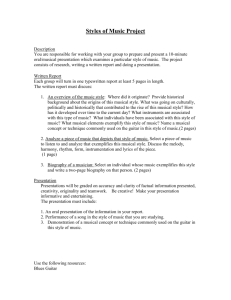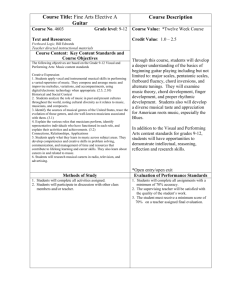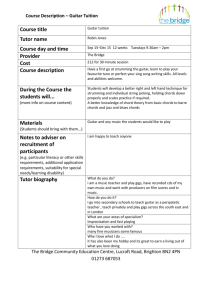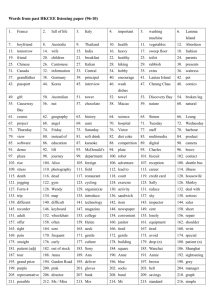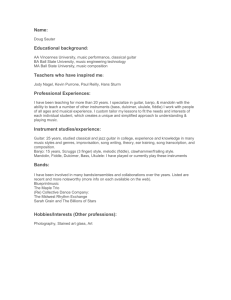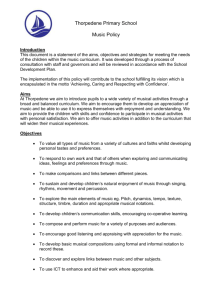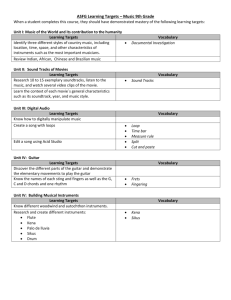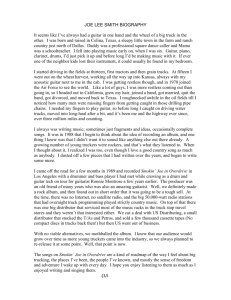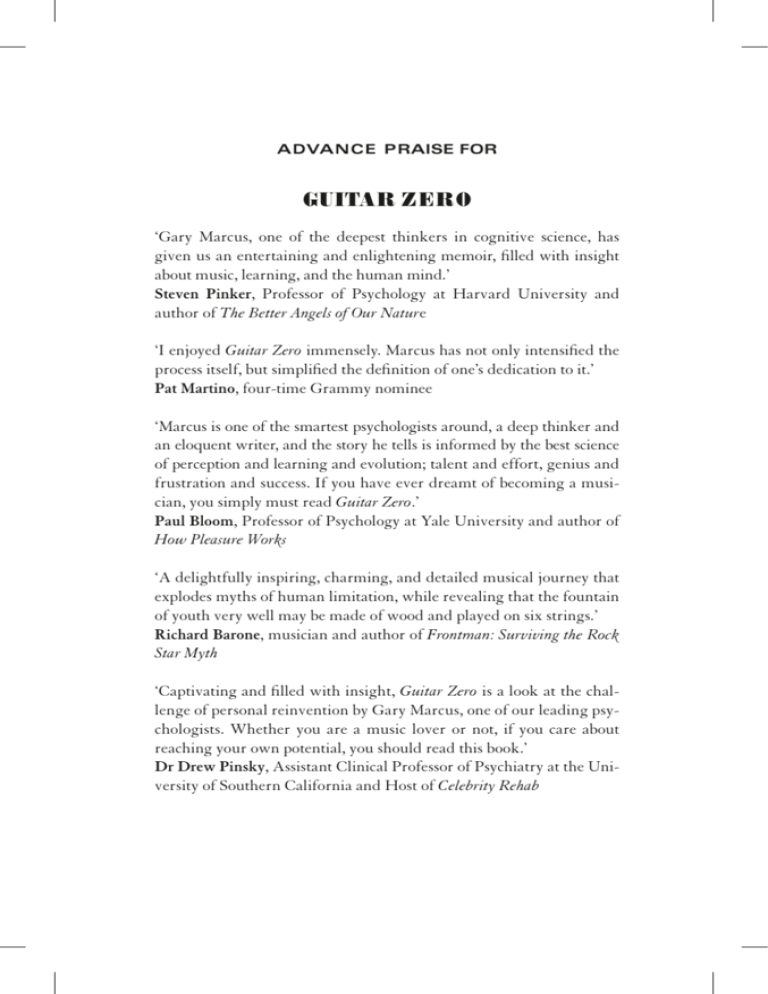
ADVANCE PRAISE FOR
GUITAR ZERO
‘Gary Marcus, one of the deepest thinkers in cognitive science, has
given us an entertaining and enlightening memoir, filled with insight
about music, learning, and the human mind.’
Steven Pinker, Professor of Psychology at Harvard University and
author of The Better Angels of Our Nature
‘I enjoyed Guitar Zero immensely. Marcus has not only intensified the
process itself, but simplified the definition of one’s dedication to it.’
Pat Martino, four-time Grammy nominee
‘Marcus is one of the smartest psychologists around, a deep thinker and
an eloquent writer, and the story he tells is informed by the best science
of perception and learning and evolution; talent and effort, genius and
frustration and success. If you have ever dreamt of becoming a musician, you simply must read Guitar Zero.’
Paul Bloom, Professor of Psychology at Yale University and author of
How Pleasure Works
‘A delightfully inspiring, charming, and detailed musical journey that
explodes myths of human limitation, while revealing that the fountain
of youth very well may be made of wood and played on six strings.’
Richard Barone, musician and author of Frontman: Surviving the Rock
Star Myth
‘Captivating and filled with insight, Guitar Zero is a look at the challenge of personal reinvention by Gary Marcus, one of our leading psychologists. Whether you are a music lover or not, if you care about
reaching your own potential, you should read this book.’
Dr Drew Pinsky, Assistant Clinical Professor of Psychiatry at the University of Southern California and Host of Celebrity Rehab
01
02
03
04
05
06
07
08
09
10
11
12
13
14
15
16
17
18
19
20
21
22
23
24
25
26
27
28
29
30
S31
N32
ABOUT THE AUTHOR
Gary Marcus is Professor of Psychology and Director of the New
York University Center for Language And Music (CLAM), where he
studies evolution, language, and cognitive development. He has written three books about the origins and development of the mind and
brain, including The Algebraic Mind, The Birth of the Mind, and Kluge,
and is also the editor of The Norton Psychology Reader. His scientific
articles have been published in leading journals, such as Science and
Nature, and his essays have appeared in Wired, the Wall Street Journal,
the New York Times, and many others. He lives in New York City.
GUITAR
ZERO
The Science of
Learning to be Musical
G A RY M A R C U S
01
02
03
04
05
06
07
08
09
10
11
12
13
14
15
16
17
18
19
20
21
22
23
24
25
26
27
28
29
30
S31
N32
01
02
03
04
05
06
07
08
09
10
11
12
13
14
15
16
17
18
19
20
21
22
23
24
25
26
27
28
29
30
31S
32N
A Oneworld Book
First published in Great Britain and the Commonwealth
by Oneworld Publications 2012
Published by arrangement with The Penguin Press, a member of the Penguin
Group (USA), Inc.
Copyright © Gary Marcus 2012
The moral right of Gary Marcus to be identified as the Author of this work
has been asserted by him in accordance with the Copyright, Designs
and Patent Act 1988
Illustration credits:
Pages 41 and 205: Athena Vouloumanos
Page 140: Gary Marcus
Pages 18 and 218: Meighan Cavanaugh based on sketches by the author.
All rights reserved
Copyright under Berne Convention
A CIP record for this title is available
from the British Library
ISBN: 978-1-85168-932-3
Ebook ISBN: 978-1-78074-100-0
Designed by Meighan Cavanaugh
Cover design by www.shepherdstudio.co.uk
Printed and bound by CPI Mackays
Oneworld Publications
185 Banbury Road, Oxford, OX2 7AR, England
I’ve been obsessed with the guitar since I was twelve. In many
ways my life has been one long conversation about the guitar,
interrupted only by the countless hours of deep pleasure I have
playing the darn things, as well as some less pleasant time spent
doing what needs to be done so that I can get back to playing and
chatting about them.
—Perry Beekman, jazz guitarist
First you learn your instrument, then you learn the music, and
then you forget all that s**t and just play.
—Charlie Parker
01
02
03
04
05
06
07
08
09
10
11
12
13
14
15
16
17
18
19
20
21
22
23
24
25
26
27
28
29
30
S31
N32
CONTENTS
Tuning Up
1
Take Me to the River
11
Learning to Crawl
23
It Don’t Come Easy
35
Talking Heads
53
Back to School
65
School of Rock
85
True Talent
97
Into the Groove
107
01
02
03
04
05
06
07
08
09
10
11
12
13
14
15
16
17
18
19
20
21
22
23
24
25
26
27
28
29
30
S31
N32
01
02
03
04
05
06
07
08
09
10
11
12
13
14
15
16
17
18
19
20
21
22
23
24
25
26
27
28
29
30
31S
32N
Onstage
119
The Worst Song in the World
123
Knowing Without Knowing
147
Take It to the Limit
161
Heavy Metal
191
Epilogue
203
Acknowledgements
207
Glossary
211
Notes
220
References
236
Index
264
GUITAR
ZERO
01
02
03
04
05
06
07
08
09
10
11
12
13
14
15
16
17
18
19
20
21
22
23
24
25
26
27
28
29
30
S31
N32
TUNING UP
What Does It Take
to Become Musical?
A
re musicians born or made?
All my life I wanted to become musical, but I always assumed
that I never had a chance. My ears are dodgy, my fingers too clumsy.
I have no natural sense of rhythm and a lousy sense of pitch. I have
always loved music but could never sing, let alone play an instrument;
in school I came to believe that I was destined to be a spectator, rather
than a participant, no matter how hard I tried.
As I grew older, I figured my chances only diminished. Our lives,
once we finish school, tend to focus on execution rather than enrichment. Whether we are breadwinners or caretakers, our success is measured by outcomes. The work it takes to achieve those outcomes, we
are meant to understand, is something that should happen quickly and
behind closed doors. If the conventional wisdom is right, by the time
we are adults it’s too late to learn anything new. Children may be able
to learn anything, but if you wanted to learn French, you should have
started when you were six.
f
01
02
03
04
05
06
07
08
09
10
11
12
13
14
15
16
17
18
19
20
21
22
23
24
25
26
27
28
29
30
S31
N32
G U I TA R Z E R O
01
02
03
04
05
06
07
08
09
10
11
12
13
14
15
16
17
18
19
20
21
22
23
24
25
26
27
28
29
30
31S
32N
Until recently, science supported this theory. Virtually everybody in
developmental psychology was a firm believer in ‘critical periods’ of
learning. The idea is that there are particular time windows in which
complex skills can be learned; if you don’t learn them by the time the
window shuts, you never will. Case closed.
But the evidence for critical periods is surprisingly weak. Consider,
for example, the often-cited case of Genie, an unfortunate girl who was
locked in a silent room for many years. When Genie escaped at the
age of thirteen, she was exposed to language for the first time, and she
was never able to become fluent. Her vocabulary was good enough to
get her started, but her grammar was a mess, filled with utterances
like ‘Spot chew glove’ and ‘Applesauce buy store’. Does this mean that
Genie’s critical period for language had passed? Most people interpret
her case that way, but another explanation, less often considered, is that
Genie’s inability to learn language may have come in part from the
emotional trauma (and perhaps malnutrition) she had suffered early
on. Her case is consistent with the critical period hypothesis, but it certainly doesn’t prove it.
The more people have actually studied critical periods, the shakier
the data have become. Although adults rarely achieve the same level
of fluency that children do, the scientific research suggests that differences typically pertain more to accent than to grammar. Meanwhile,
contrary to popular belief, there’s no magical window that slams shut
the moment puberty begins. In fact, in recent years scientists have identified a number of people who have managed to learn second languages
with near-native fluency, even though they only started as adults.
If critical periods aren’t quite so firm as people once believed, a
world of possibility emerges for the many adults who harbour secret
dreams – whether to learn a language, to become a pastry chef, or to
pilot a small plane. And quests like these, no matter how quixotic they
may seem, and whether they succeed in the end or not, could bring
unanticipated benefits, not just for their ultimate goals but for the
2
TUNING UP
journey itself. Exercising our brains helps maintain them, by preserving plasticity (the capacity of the nervous system to learn new things),
warding off degeneration, and literally keeping the blood flowing.
Beyond the potential benefits for our brains, there are benefits for our
emotional well-being, too. There may be no better way to achieve lasting happiness – as opposed to mere fleeting pleasure – than pursuing a
goal that helps us broaden our horizons.
f
Still, from primary school onward, every musical attempt I made
ended in failure. The first time I tried to play guitar, a few years ago,
my friend Dan Levitin (who had not yet finished his book This Is Your
Brain on Music) kindly offered to give me a few lessons. When I came
back to him after a week or two of practice, he quickly realized what
my primary school teachers had realized long ago: that I had no sense
of rhythm whatsoever. Dan offered me a metronome, and when that
didn’t help, he gave me something my teachers couldn’t – a diagnosis:
congenital arrhythmia.
And yet I never lost the desire to play. Music hasn’t been studied
as systematically as language in terms of critical periods, but there are
certainly artists who started late and still became first-rate musicians.
Tom Morello – guitarist of Rage Against the Machine and Rolling
Stone magazine’s twenty-sixth-greatest guitarist of all time – didn’t
start until he was seventeen. Patti Smith scarcely considered becoming
a professional singer until she was in her mid-twenties. Then there is
the jazz guitar legend Pat Martino, who relearned how to play after
a brain aneurysm at the age of thirty-five, and the New Orleans keyboard legend Dr John, who switched his primary allegiance from guitar
to piano at age twenty-one (after his left ring finger was badly injured
in a barroom fight) and won the first of his five Grammy Awards at
forty-eight.
3
01
02
03
04
05
06
07
08
09
10
11
12
13
14
15
16
17
18
19
20
21
22
23
24
25
26
27
28
29
30
S31
N32
G U I TA R Z E R O
01
02
03
04
05
06
07
08
09
10
11
12
13
14
15
16
17
18
19
20
21
22
23
24
25
26
27
28
29
30
31S
32N
Given my arrhythmia, I had no aspiration of reaching such heights,
but at thirty-eight, long after I had completed my PhD and become a
professor of cognitive psychology, I realized that my desire to become
musical wasn’t going away. I wanted to know whether I could overcome my intrinsic limits, my age, and my lack of talent. Perhaps few
people had less talent for music than I did, but few people wanted more
badly to be able to play.
f
My first ray of hope came, oddly enough, from a video game, which I
bought with the idea that it might improve my rhythm. The game I
am referring to is, of course, Guitar Hero, perhaps the most mindless
yet entertaining game I have ever played. In case you haven’t seen it,
the basic premise is that coloured dots fall from the top of the screen, in
time with music, and as a player your mission consists of nothing more
than the pressing of matching coloured buttons on a plastic guitar in
time with the falling dots.
What makes it fun is that the game plays a snippet of music each
time the player presses a button at the right moment, yielding the illusion that the player is actually playing a song.
Or not. If one’s timing is bad enough (as mine was initially), you
hear a beep instead of the musical snippet, and worse, the crowd begins
to boo. Play badly enough, and the crowd boos you off the stage. I know
this rather too well, because every time I tried to play the opening song
– a regrettable piece of 1970s blues rock called ‘Slow Ride’, by Foghat –
the crowd soon began to boo, louder and louder, until the song stopped
midway through, inevitably accompanied by the rather brutal and
unimaginative message informing me that I had ‘failed’. As the failures
piled up, I was brought back to fourth grade – year five – when I had
tried to learn to play the recorder (a sort of poor man’s flute that was popular in the Baroque era) and was so musically naive I couldn’t get past
4
TUNING UP
‘Mary Had a Little Lamb’. Guitar Hero might be a poor substitute for
real guitar, but for a musical dunce like me even Guitar Hero seemed out
of reach; I soon packed the game away and returned to my ordinary life.
But then a funny thing happened. My wife, Athena, returned home
from a trip to see friends and raved about how much fun she’d had
playing a counterpart to Guitar Hero called Rock Band.
f
Our copy of Guitar Hero came out of the closet, and thus my new life
began. Trying again, but this time with the benefit of Athena’s feedback
(telling me when I was pressing the buttons too early versus when I was
pressing too late), I finally managed to play ‘Slow Ride’ all the way
through, with nary a boo. I was so excited I could barely speak. My first
taste, ever, of quasi-musical success – it was nothing short of intoxicating.
For weeks, I kept practising, and soon I started getting better and
better. I never made it to expert mode, but I eventually got through
medium and became obsessed with a different question. I didn’t want
to while away my later years playing a video game, but if I could make
progress with a plastic controller, could I learn to play a real guitar? I
began to wonder: Could persistence and a lifelong love of music overcome age and a lack of talent? And, for that matter, how did anyone of
any age become musical?
It was time to find out.
f
To an alien scientist, music – and the desire to create it – might be one
of the most puzzling aspects of humanity. Any species, for instance,
would presumably have a metabolism, and any reasonably intelligent
species would likely also have a system of communication; eventually
we would expect it to develop systems of government and law, too. But
5
01
02
03
04
05
06
07
08
09
10
11
12
13
14
15
16
17
18
19
20
21
22
23
24
25
26
27
28
29
30
S31
N32
G U I TA R Z E R O
01
02
03
04
05
06
07
08
09
10
11
12
13
14
15
16
17
18
19
20
21
22
23
24
25
26
27
28
29
30
31S
32N
would such creatures also revere patterns of sound that vary over time?
I wonder, would they have any desire to make their own music?
Someday, maybe we will find out, but for now, one thing was clear:
my own desire to make music was undeniable. I had reached the point
where it felt like it was now or never. I began to read up on the scientific
literature. How did children learn music? Were there any lessons for
adults?
To my surprise, although children had been well studied, there was
hardly any systematic research on people my age. Nobody seemed to
know much about whether adults could pick up an instrument late in
life, and it wasn’t just music that we knew little about; the literature
on the capacity of adults to learn new skills in general was far sparser
than I had imagined. We know something about gradual declines in
memory, but the only truly firm result I could find with respect to the
late learning of music in particular concerned perfect pitch (the ability
to identify a single note in isolation). For that, one must indeed start
early, but lucky for me and anyone else starting late, it is also quite clear
that perfect pitch is more luxury than necessity. Duke Ellington didn’t
have it, and neither did Igor Stravinsky (nor, for that matter, did Joey
Ramone).
Several other studies show some kind of advantage for music learners who began earlier in life over adults who began later, but most of
those don’t control for total amount of practice. When it came to other
aspects of music, such as the ability to improvise or compose, or even
to learn a simple melody, there was almost no compelling literature.
Although any number of studies have shown that the more you practise
the better you get, startlingly few have compared what happens when
people of different ages get the same amount of practice.
How could such a basic scientific question remain so unanswered? I
wondered about this for months, until Caroline Palmer, a soft-spoken
but exceptionally clear-thinking professor of psychology at McGill University in Montreal, finally explained the answer to me. The problem
6
TUNING UP
wasn’t a lack of scientific interest; it was a lack of subjects. To learn a
musical instrument, you need to put in a lot of work – ten thousand
hours is an oft-mentioned (if somewhat oversold) number – and to do
a proper study, you’d need a reasonably large sample of participants,
which is to say a big group of adult novices with sufficient commitment. Nobody has studied the outcomes of adults who put in ten thousand hours of practice starting at age forty-two because most people of
that age have lives and responsibilities. Your average forty-two-yearold might go to lessons once or twice a week, but eventually the burdens of a child, a job, or an ageing parent often take over; few adult
learners of music are prepared to invest the kind of time that a teenager
has. No subjects, no science.
At that point, I decided to become a guinea pig. I couldn’t ethically
force other adults to practise for ten thousand hours, but I could experiment on myself. As it happened, I had a sabbatical coming up, which
would give me more free time than usual, and I decided to see what
would happen if I devoted myself to music full-time, for a month or
two – or as long as I could stand. If someone as tuneless as I could make
progress, perhaps there was hope for anyone.
f
At the outset of my journey, one study in particular gave a glimmer of
hope.
For years, the strongest scientific evidence for critical periods came
not from humans but from animals. To properly establish the existence
of a critical period, one needs to do an experiment in which young animals are raised in a carefully controlled environment.
In the literature on critical periods, one of the most influential
experiments came from raising barn owls. Barn owls, as it happens,
are a little like bats: they rely heavily on sound to navigate. At the same
time, however, they can see better than bats typically do, and one of the
7
01
02
03
04
05
06
07
08
09
10
11
12
13
14
15
16
17
18
19
20
21
22
23
24
25
26
27
28
29
30
S31
N32
G U I TA R Z E R O
01
02
03
04
05
06
07
08
09
10
11
12
13
14
15
16
17
18
19
20
21
22
23
24
25
26
27
28
29
30
31S
32N
first things they do after hatching is to calibrate their eyes with their
ears, lining up what they hear with what they see. This allows them
to use sound cues to help them navigate in their dark nocturnal world.
But exact mapping between eyes and ears cannot be hardwired at birth,
because the navigational function of the auditory information depends
on the exact distance between the two ears, and that distance changes
as an animal grows.
How do owls manage to calibrate the visual world with the auditory
world? The Stanford biologist Eric Knudsen explored this question by
raising owls in a kind of virtual reality world, in which prisms shifted
everything by twenty-three degrees. This disrupted the owl’s normal
capacity to see and forced the owl to adjust its internal map of the visual
world. The earlier the prisms were installed, the better the owls were
able to cope with the altered world. Young owls could easily learn to
compensate for the distortion, whereas old owls could not.
If that were the only paper I had read, I would have given up on
the guitar right there. But I soon stumbled on a more recent study, less
widely known, in which Knudsen discovered that older owls weren’t
entirely hopeless after all. Although Knudsen’s original results still stand
– adults definitely aren’t as flexible as baby owls – adult owls can often
get to the same place, so long as their job is broken down into smaller
bite-size steps. Adult owls couldn’t master twenty-three degrees of distortion all in one go, but they could succeed if the job was broken down
into smaller chunks: a few weeks at six degrees, another few weeks at
eleven degrees, and so on.
Maybe I didn’t have talent, and maybe I was old (or at least no longer
young), but I was willing to take it slow. Could adults like me acquire
new skills if we approached them bit by bit, owl-style?
This book is about how I began to distinguish my musical derriere from
f
8
TUNING UP
my musical elbow, but it’s not just about me: it’s also about the psychology and brain science of how anybody, of any age – toddler, teenager,
or adult – can learn something as complicated as a musical instrument.
What does it take to learn to play an instrument? What makes
learning new skills so labour-intensive, when learning to talk seems so
easy and so natural? Do children really have an advantage? Can adults
make up for any disparity with directed practice?
Along the way, I marvel at the wonder that is music and the human
desire to create and enjoy it. I take a look at the nature of music itself
and how it evolved culturally and biologically. I explore what separates
true experts from mere amateurs and debunk the myth of a ‘music
instinct’ yet show that talent really does exist.
At the same time, I ask whether learning music makes people
smarter and investigate what it takes to be a good teacher. Should
parents encourage their children to play real musical instruments, or
should they relax and let their kids play Guitar Hero instead?
With a guitar in one hand and a laptop in the other, I set out to
understand the limits of human reinvention and how humans, young
and old, talented or otherwise, become musical.
9
01
02
03
04
05
06
07
08
09
10
11
12
13
14
15
16
17
18
19
20
21
22
23
24
25
26
27
28
29
30
S31
N32

